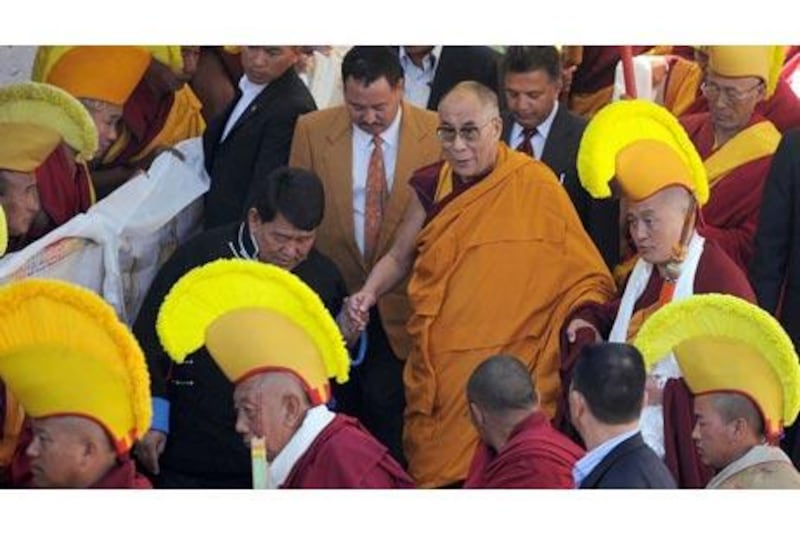NEW DELHI // The Dalai Lama arrived in the monastery town of Tawang in north-east India yesterday on a trip that has angered China, which claims much of the surrounding state of Arunachal Pradesh as its own. Yellow-hatted monks, from the Dalai Lama's Gelugpa sect of Tibetan Buddhism, clanged cymbals and blew on traditional long horns as he arrived at the Galden Namgyal Lhatse monastery from a nearby helipad.
Thousands of poor villagers braved the freezing weather to welcome the Tibetan spiritual leader who first passed though the Himalayan town 50 years ago when he fled his homeland after a failed uprising against Chinese rule. "I am very happy to be here in Tawang as there are a lot of emotions involved," he told reporters after opening a new museum in the monastery where he recovered from dysentery in 1959 after an arduous, two-week long trek out of Tibet.
Tawang residents spent weeks sprucing up the town and their homes for the Dalai Lama's visit, while pilgrims had been pouring in since Friday, many of them travelling for days by truck and by foot along perilous roads to catch a glimpse of the man they revere as a living god. "The old people are so happy, they say we can see his face, hear his voice; now I can die peacefully," Guru Tulku Rinpoche, the abbot of the monastery, said in an interview.
Both the Indian government and the Dalai Lama insist that the week-long trip to the region, which he has visited four times during his time in exile, is purely spiritual. But his visit to a state that has historic links to Tibet and is claimed by both India and China has enraged Beijing and is likely to further worsen already poor relations between the two countries. India believes Tibet ceded Arunachal to the British under the 1914 Shimla Accord and that it became part of modern India after independence in 1947. Beijing, which calls the state South Tibet, refuses to recognise the treaty because it claims that Tibet has been an integral part of China for centuries and was therefore not empowered to sign away the territory.
In 1962, India and China fought a brief but bloody war over Arunachal and another swath of land in Kashmir, in north-west India. After a brief occupation, the Chinese pulled out of Arunachal, but they still control a portion of land India says belongs to it. Today, Indian and Chinese armies maintain an uneasy truce along sections of both borders, neither of which are clearly defined. Reports of increased border incursions from the Chinese side over the past few years have led the Indian government to announce it will boost troop levels in Arunachal this year.
And last month, before local elections, the Indian prime minister, Manmohan Singh, visited the state. Both actions drew strong criticism from Beijing. However, the Chinese are particularly angered by the visit by the Dalai Lama, whom they regard as a "splittist" intent on fomenting separatist unrest in Tibet. Last year, Beijing accused the Dalai Lama and the Tibetan government in-exile - which is based in the north Indian hill station of Dharamsala - of organising fierce anti-China riots in Lhasa and other Tibetan towns.
The Indian government has defended the Dalai Lama's right to travel where he wishes in India, but sought to mitigate the diplomatic fallout from the trip by barring foreign journalists - and from The National - from travelling to Arunachal. It is also believed he has been told to refrain from making incendiary political comments while there. Yesterday he was at pains to stress the religious nature of his trip.
"My vist to Tawang is non-political and aimed at promoting universal brotherhood and nothing else," he said. But the Chinese and other Tibet watchers see a possible ulterior motive to the trip. The Dalai Lama is now 74 and he has had several health scares in recent years, causing many of his followers to worry about who will emerge as his successor or reincarnation. The Chinese government is almost certain to select a new Dalai Lama of its own inside Tibet.
However, the current Dalai Lama has said that this time he may be reincarnated outside of Tibet, and Tawang, the birthplace of the sixth Dalai Lama, would be a natural place to look. The Dalai Lama, who is the 14th incarnation, has even suggested that he may choose to be reincarnated before he dies or that he might return as a woman. hgardner@thenational.ae






